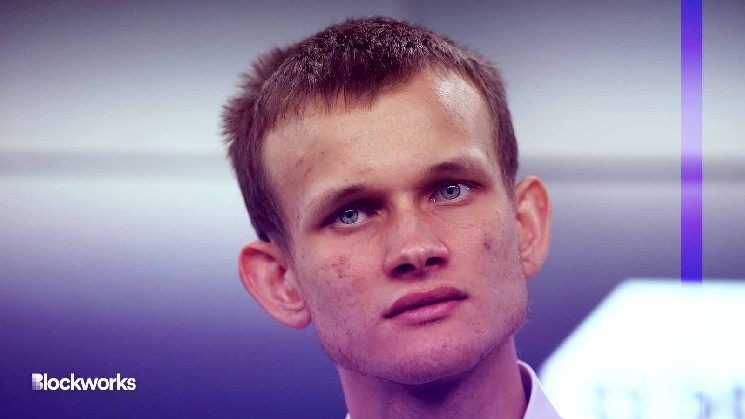Don’t Overuse Social Consensus, Vitalik Warns

Ethereum co-founder Vitalik Buterin advised the developer community to guard against overburdening the networks’ social consensus — the ultimate arbiter of what the Ethereum network canonically is.
Staked ether, so crucial to network security, is poised to become an important collateral asset in DeFi, through the use of liquid staking tokens (LSTs), such as Lido’s stETH and Rocketpool’s rETH. But it’s also expected to become useful in other contexts, thanks to bleeding edge tech, such as the restaking primitive from Eigenlayer, which will allow staked ETH to serve a dual function.
In his first blog post about Ethereum since March, Buterin extended the credible neutrality imperative to any attempt to leverage the Ethereum validator set — including, but not limited to restaking — warning against efforts to “recruit Ethereum social consensus for [an] application’s own purposes.”
In the form of a cautionary thought experiment using Harry Potter characters, Buterin outlined certain risks that could arise if proposals to rehypothecate staked ether are not carefully thought through.
Re-using validators’ stake can be done safely, he argues, so long as the social consensus isn’t relied upon as a backstop.
“If […] you have the intent to rope in the broader Ethereum ecosystem social consensus to fork or reorg to solve your problems, this is high-risk, and I argue that we should strongly resist all attempts to create such expectations,” Buterin wrote.
As an example of a “high-risk” gamble, Buterin pictured a layer-2 created by “Hermione” that grows to become the dominant scaling solution. The fictional Ethereum wizard claims that her layer-2 is thus the most secure, “because if there is a bug that causes funds to be stolen, the losses will be so large that the community will have no choice but to fork to recover the users’ funds.”
Arbitrum One currently has $5.77 billion in total value locked (TVL) according to L2Beat, more than triple the size of the next largest scaling solution, Optimism.
Right now, there is no indication that a catastrophic bug in Arbitrum would prompt calls for Ethereum mainnet operators to take action. But since Arbitrum’s developer, Offchain Labs, also owns Prysmatic Labs — the company behind the second-largest Prysm consensus client — it’s not an absurd proposition, either.
Buterin doesn’t want a repeat of The Dao, or the Parity bug, both of which challenged Ethereum’s social consensus at a time when the network was much smaller.
In the former case, the network forked, leaving behind Ethereum Classic (ETC), which continues to operate at a $2.5 billion market cap to this day. In the latter, the network did not fork, and 513,774 ether were locked forever. That was a painful choice, but it set a precedent for the future: Ethereum transactions are immutable, what Buterin refers to in his post as the blockchain’s “purity.”
“A blockchain’s ‘purity’ in the sense of it being a purely mathematical construct that attempts to come to consensus only on purely mathematical things, is a huge advantage,” he wrote.
He urged avoidance of “perverse too-big-to-fail mechanics,” to “preserve the chain’s minimalism, support uses of re-staking that do not look like slippery slopes to extending the role of Ethereum consensus, and help developers find alternate strategies to achieve their security goals.”
Eigenlayer co-founder Sreeram Kannan, was quick to agree, in a Twitter thread:
“a) don’t build complex financial primitives on restaking — they can spiral out
b) don’t rely on Ethereum to fork for application layer errors — this is a super important principle
c) do not use subjective slashing — as it is subject to tyranny of the dishonest majority.”
There are “three underlying trust models underpinning Eigenlayer,” according to Kannan. These are economic trust, decentralization trust and ETH validator commitments, and each with their own potential use cases.
But it remains to be seen which, if any, will be embraced by Ethereum validators.
Blockworks Research analyst Ren Yu Kong is skeptical that there will be a wide variety of restaking applications that will pass muster with Ethereum validators.
“I believe that there won’t be many projects out there that are worth a validator to restake with given the additional risks incurred for a small marginal return, and now Vitalik has highlighted an important additional ‘social consensus’ risk,” he said.






 Bitcoin
Bitcoin  Ethereum
Ethereum  Tether
Tether  USDC
USDC  TRON
TRON  Dogecoin
Dogecoin  Cardano
Cardano  Bitcoin Cash
Bitcoin Cash  Monero
Monero  Chainlink
Chainlink  LEO Token
LEO Token  Stellar
Stellar  Zcash
Zcash  Litecoin
Litecoin  Hedera
Hedera  Dai
Dai  Cronos
Cronos  Tether Gold
Tether Gold  OKB
OKB  Ethereum Classic
Ethereum Classic  KuCoin
KuCoin  Cosmos Hub
Cosmos Hub  Gate
Gate  Algorand
Algorand  VeChain
VeChain  Stacks
Stacks  Tezos
Tezos  Dash
Dash  TrueUSD
TrueUSD  IOTA
IOTA  Theta Network
Theta Network  Basic Attention
Basic Attention  Decred
Decred  NEO
NEO  Synthetix
Synthetix  Qtum
Qtum  Ravencoin
Ravencoin  0x Protocol
0x Protocol  Zilliqa
Zilliqa  DigiByte
DigiByte  Nano
Nano  Holo
Holo  Siacoin
Siacoin  Numeraire
Numeraire  Waves
Waves  Ontology
Ontology  Status
Status  Enjin Coin
Enjin Coin  BUSD
BUSD  Hive
Hive  Pax Dollar
Pax Dollar  Lisk
Lisk  Steem
Steem  Huobi
Huobi  OMG Network
OMG Network  NEM
NEM  Bitcoin Gold
Bitcoin Gold  Augur
Augur  Bitcoin Diamond
Bitcoin Diamond